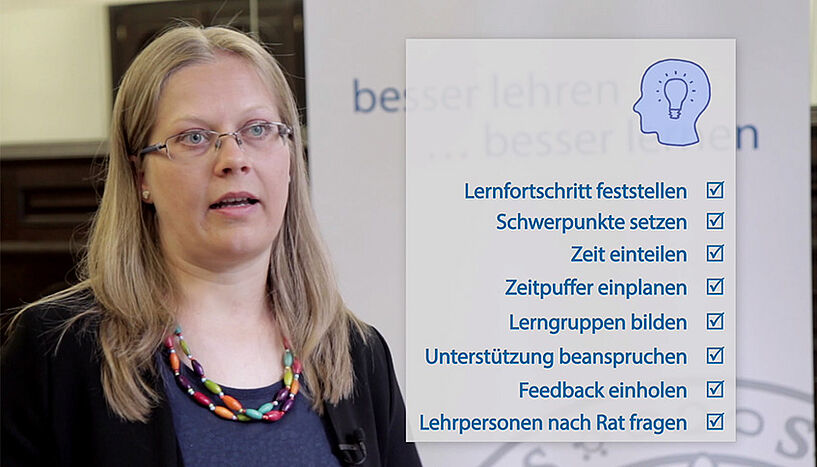Coping with test anxiety
| 17. Februar 2017Are you anxious before exams? Completely normal. Do you feel pressure to perform and psychological stress because of test anxiety? This is a problem. uni:view talked to a student about his experiences and asked psychologist Barbara Schober what test anxiety is and how you can cope with it.
Daniel is about to graduate soon. He still has to sit one Latin examination before he can start writing his thesis. But so far, the 28-year-old student wasn't able to overcome this obstacle. The reason: test anxiety. "I already took the Latin exam once a few years ago, but I failed. But to be honest, I hadn't studied all that much for it at the time. A few semesters later I tried it again – well-prepared this time – and had a total blackout during the exam. I sat in the room for three hours, didn't write down a word and handed in the blank exam papers in the end", says the student.
What causes blackouts like this one in exam situations? "Studies show that people suffering from test anxiety perform worse in exams than people who are not suffering from test anxiety – even if they have similar prior knowledge and similar levels of intelligence. This becomes especially noticeable when people concerned have to solve difficult tasks that demand total concentration. If you then think too much about yourself or about your shortcomings and possible consequences, it can cause some kind of block in task-related thinking: You notice that you are doing badly and as a result can't reproduce any knowledge", explains psychologist Barbara Schober from the Department of Applied Psychology: Work, Education and Economy of the University of Vienna.

Barbara Schober has been Professor for Psychological Research on Education and Transfer at the University of Vienna since 2011. In addition, she has been the Dean of the Faculty of Psychology since October 2016. The educational psychologist conducts research on promoting motivation in the context of schools, self-regulation, the development and evaluation of intervention measures in the field of educational psychology, gender-specific educational trajectories and other topics. (Photo credits: Barbara Mair/University of Vienna)
How do I know if I suffer from test anxiety?
It is perfectly normal to feel tense and agitated before an exam. In fact, it may even improve your performance. "It becomes problematic when the fear of failure becomes too great and you feel trapped in a cycle that you can't seem to control", explains Barbara Schober, describing this cycle as follows: "Studying becomes more and more difficult, you continuously think about the possibility of failing and the preparation for the exam suffers as a result. As a consequence, examination results are often actually poor, allowing the fear that you will never (again) be able to handle similar situations to grow."
Consequently, people concerned avoid taking exams and the fear continues to grow. Daniel kept postponing his third examination attempt, thereby letting his inner pressure increase until he experienced a depressive episode in the summer.
Advice on test anxiety
Test anxiety has individual causes which is why coping measures have to focus on different issues. Barbara Schober lists five approaches that can help cope with test anxiety:
1. Preparing for the exam properly: Do not only study "a lot", but also the "right" way, draw up study plans and stick to them. You should also ask yourself: what is required, what do I already know, what do I not know yet, how much can I study and when...? This will also make you aware of your achievements.
2. Relaxation techniques and reducing anxiety: Yoga and autogenic training are only two possible options – what is most important is that you know what to do when you feel the panic rising.
3. Learn how to consciously think positive: Write down sentences that reduce negative thoughts and keep reminding yourself of them. For instance, the sentence "I can do it, I can cope with it, I have practised it" might work as a mantra to counter the thought "I cannot handle it anyway".
4. Set realistic objectives: Do not demand too much of yourself. This way, you can enjoy success.
5. "Do not treat everything with the utmost seriousness": Take a close look at what is so threatening about a possible failure and question it. A good strategy would certainly also be to "reduce perfectionism".
In cases of severe test anxiety, seeking professional help can be a good idea. As it was in Daniel's case. He eventually visited the Psychological Counseling Services in the eighth district of Vienna.

The Psychological Counseling Services is a service organised by the Federal Ministry for Education, Arts and Culture and aims at supporting students and prospective students with psychological and psychotherapeutic measures. Their services are available for free and include psychological counselling, advice on the selection of degree programmes, coaching and supervision. Counselling services are available in Vienna, Graz, Innsbruck, Klagenfurt, Linz and Salzburg. (Photo credits: Screenshot studierendenberatung.at)
Facing test anxiety
"I knew that something like this exists, but I had no idea how it works", says Daniel about the Psychological Counseling Services and shares his experiences: "After the first session, I was fortunately able to join a group therapy, as a new 'test anxiety group' was just about to start. We were five to six people who all had some sort of problem with test anxiety." In addition, he had weekly talking therapy sessions to address the individual causes of his anxieties. Test anxiety is a mixture of real and neurotic anxiety, that is to say, it is closely connected with previous anxieties, problems with self-esteem and unresolved conflicts.
Mark the date: At the beginning of February, the first meeting of the test anxiety group 2017 takes place at the Psychological Student Counseling centre. You can take part in the group sessions following an extensive individual evaluation. Contact
"I am glad I took this step"
Daniel is hopeful that he will soon pass the last Latin examination and concludes: "The psychological counselling helped me a lot. But you have to take this step because you want it yourself. Five people telling you that you should get help doesn’t work. It took me a few months as well, until I was ready. But I am glad I took this step." (mw)




